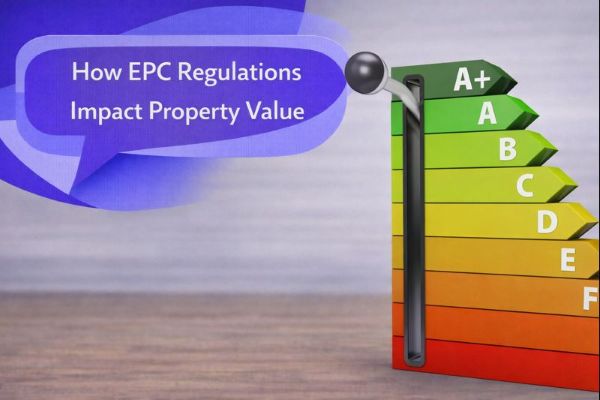How EPC Regulations Impact Property Value | Energy efficiency is no longer just a green badge of honour; it’s becoming a major factor in property valuation and mortgage affordability. Whether you’re a homeowner, buy-to-let investor, or first-time buyer, understanding EPC regulations could significantly affect your property’s worth and future saleability.
In this article, we break down what EPC ratings mean, how they influence property value, and what you can do to improve your energy efficiency score.
What Is an EPC?
An Energy Performance Certificate (EPC) gives your property a rating from A (most efficient) to G (least efficient). It assesses energy usage and CO₂ impact and is required when selling or renting a home.
- Valid for 10 years
- Includes estimated energy costs
- Offers recommendations for improving efficiency
An EPC is more than just paperwork; it can directly influence your home’s market appeal, value, and even the mortgage options available.
EPC and Property Value: What’s the Link?
As energy regulations tighten and fuel prices climb, energy efficiency is becoming a key driver in property decisions. Properties with low EPC ratings may:
- Sell for less than similar homes with better ratings
- It takes longer to sell
- Be less attractive to eco-conscious buyers and tenants
- It will be harder to finance with mainstream mortgage lenders
On the other hand, a strong EPC rating can boost property value, support eligibility for green mortgages, and reduce ownership costs.
Learn more in our Remortgaging & Property Investment guide
Landlords: Why You Must Pay Attention
The UK government has introduced regulations for the private rented sector, requiring rental properties to meet a minimum EPC rating (currently E, with proposals for this to rise to C in the coming years).
This means landlords with F- or G-rated properties may need to upgrade insulation, boilers, windows, or lighting to remain compliant or risk financial penalties.
If you’re letting property, reviewing your EPC is essential to protect long-term rental income and maintain portfolio value.
Need expert mortgage guidance for upgrading or refinancing? “Find Mortgage Advisers” who specialise in eco-property lending.
Improving Your EPC Rating
Improving your EPC rating doesn’t always require a major renovation. Here are some practical upgrades:
- Install loft or cavity wall insulation
- Replace old boilers with energy-efficient models
- Upgrade to double or triple glazing
- Use LED lighting throughout the home
- Add smart thermostats or solar panels
Some improvements are eligible for green mortgage incentives, helping homeowners borrow at more competitive rates when upgrading their homes.
Explore how home improvements affect your borrowing options in our Homeowner Mortgages section.
EPC and Mortgage Lenders
Lenders are increasingly integrating EPC ratings into their affordability models and product offerings. This means:
- Higher-rated homes may be eligible for green mortgage deals with better rates
- Lower-rated homes may see stricter borrowing terms or higher interest rates
- Remortgaging could depend on property efficiency
Efficiency = Value
Whether you’re buying, selling, or remortgaging, it’s wise to factor EPC into your mortgage planning. EPC regulations aren’t just about compliance; they directly impact your property’s financial future. By boosting your EPC rating, you not only reduce energy bills but also enhance your home’s market value and widen your mortgage options.
To get personalised advice on green mortgages or financing property improvements, Find Mortgage Advisers who can support you every step of the way.
The Benefits of Green Mortgages
To encourage energy-efficient homes, many lenders now offer Green Mortgages with added incentives. These benefits may include lower interest rates, cashback deals, or improved loan terms. However, eligibility typically requires your property to have an EPC rating of C or higher.
If you are considering a remortgage, it’s essential to review your current EPC certificate and explore ways to raise your property’s energy performance. Simple upgrades can make a meaningful difference and unlock access to more favourable mortgage products.
Improve Energy Efficiency to Unlock Better Mortgage Terms
By upgrading your property to meet higher energy standards, you can strengthen your mortgage eligibility and potentially access Green Mortgage offers. Common improvements include:
- Installing insulation in walls, roofs, and floors
- Upgrading to a modern, efficient boiler or heating system
- Switching to energy-saving lighting and smart thermostats
- Adding double glazing or solar panels
- Replacing outdated appliances with energy-efficient alternatives
Not only do these changes support mortgage compliance with energy lending criteria, but they can also enhance your property’s value and reduce long-term energy costs.
A Smarter, Greener Financial Strategy
Improving your property’s energy efficiency offers more than just regulatory compliance. It can lead to:
- Lower monthly energy bills
- Increased home value
- Access to exclusive Green Mortgage products
- A reduced carbon footprint
By aligning your property with EPC regulations and sustainability goals, you’re not just meeting lender criteria, you’re investing in a more energy-resilient future. If you’re a broker advising clients, you can “Join our Mortgage network” to access tools and training on sustainable lending.
Speak to a Specialist Before Remortgaging
Before making any decisions, it’s wise to consult a professional adviser. A qualified mortgage adviser can assess your current EPC rating and explain which lenders offer Green Mortgage incentives. They can also suggest practical upgrades to help you meet lender requirements and access competitive rates.
Thank you for reading our “How EPC Regulations Impact Property Value | Connect Mortgage” publication. Stay “Connect“-ed for more updates soon!







